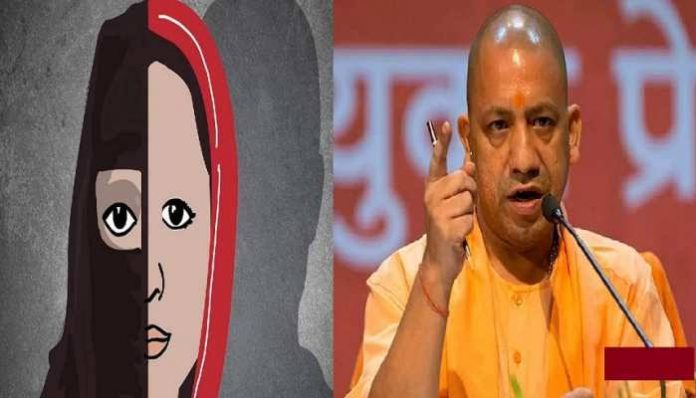This new law is yet another ploy to deprive Muslims of their rights and penalize them egregiously
Agnee Ghosh Siyasat.net
On November 1, the chief minister of Uttar Pradesh, Yogi Adityanath, announced that he would introduce a strict new law to curb “love jihad,” an Islamophobic conspiracy theory against interfaith marriages, which alleges that Muslim men lure non-Muslim women into converting to Islam by seduction. With his announcement, Adityanath issued a “warning” that those who “played with the honor” of “sisters and daughters” by concealing their religious identity would be severely punished.
Adityanath’s announcement came fast on the heels of a recent ruling by the High Court in Uttar Pradesh denying an interfaith couple police protection against the bride’s family. The bride had converted from Islam to Hinduism a month before she married a Hindu man on July 31. The decision — which cited an earlier landmark judgment in 2014 saying conversion for the sake of marriage was unacceptable when the newly-converted person does not possess any knowledge of the faith they were adopting — gave Adityanath the perfect opportunity to bring in a law against interfaith marriages and further wedge a divide between Hindus and Muslims ahead of state assembly elections in West Bengal in four months.
By the end of the month, on November 28, UP Governor Anandiben Patel cleared an ordinance decreeing any marriage that takes place by means of “unlawful conversion” will be declared null and void by the family court unless a magistrate sanctions the couple’s decision to convert and marry.
Any conversion made by “fraudulent means” is considered a “non-bailable and cognizable offense,” which means that an arrest can be made without a warrant, with a minimum sentence of two years (which can be extended up to five years); repeat offenders can have the maximum sentence doubled.

Uttar Pradesh (UP) is the fourth-largest state in India, and while its government is ruled by the Bharatiya Janata Party (BJP) — India’s right-wing, Hindu-nationalist party — it is home to a Muslim minority of 38.5 million. The “love jihad” bill is yet another attempt by Hindu nationalists to demean and malign the Muslim population by portraying Muslim men as sexual predators who commit jihad by converting Hindu women to Islam.
The rise of the BJP in 2014 has given rise to a wave of communal tension against the Muslim population. Through policymaking and online propaganda, the ruling party has effectively created an atmosphere in which bigotry against Muslims is not only tolerated but actively encouraged in society.
UP police have already filed its first case under this law in Bareily, where a Hindu woman’s father alleged that the accused, a man from the Muslim community, pressured her to convert to Islam. “The boy had abducted the girl,” Bareilly Rural Superintendent of Police Sansar Singh told the media. “He was putting pressure on the girl to convert. A case has now been filed under Sections 3 and 5 of the new ordinances.”
On December 3, the police arrested the accused man, making it the first arrest under the new anti-conversion ordinance.
In another instance that same day, the police prevented an interfaith marriage from taking place, citing that they needed permission from officials under the new ordinance, even though both parties’ families had sanctioned the marriage. Police were tipped off by a complaint from a local right-wing Hindu leader.
Discrimination built into law
There are many confusing and problematic aspects to the new ordinance in UP, not least among them: the shift of burden of proof from the converted person to the person they married; the lack of concrete definition of “allurement”; the different jail terms based on gender; and the open invitation for third parties — including the state — to inform the decision of marriage by two consenting individuals.
The ordinance prohibits conversion from one religion to another “by misrepresentation, force, fraud, undue influence, coercion, allurement or marriage” without clearly defining what constitutes any of those terms — particularly allurement.
The broad definition of the term “allurement,” upon which the ordinance appears to rely, is troubling because even providing gifts to another person is unlawful; if a non-Hindu person gifts their religious book to a Hindu to propagate their faith, it would come under the illegal “gifts” or “allurement” mentioned in the ordinance. But the right to freely practice, profess, and propagate religion is guaranteed by the Indian Constitution.
If a bride consents to the conversion, her choice alone would be disregarded by state authorities. Further, the law allows any relative of the converted person — either by blood or marriage — to question the legitimacy of the marriage.
Three forms need to be submitted by a couple from different religious communities to the district magistrate, or the additional district authorized by the district magistrate, if either of them wants to convert. Two of these forms need to be submitted by the person in the district where they live, and the third by the person who will oversee the conversion ceremony in the district where the ceremony will take place.
The district magistrate will conduct an appropriate enquiry about the intention, purpose, and cause of the proposed conversion through the state police. The ordinance requires that the partner of the converted person provide sufficient evidence that conversion did not happen solely for the sake of marriage.
However, the new ordinance does not provide a suitable time frame between conversion and marriage, so it’s unclear how the courts will decide if religious conversion happened only for that purpose. Given this confusion, it is not a stretch to suggest that the “love jihad” bill is just another tool to both demonize Muslim men and control Hindu women’s agency.
A higher degree of punishment is prescribed if men are convicted of converting a woman or minor. The greater severity directed toward men likely reflects a prevalent idea among Hindu communities regarding the “predatory” nature of Muslim men, who are accused of making false promises of love in order to convert women from other communities, thereby increasing the population of Muslims in India. A similar prejudice towards Christians assumes that members of Scheduled Castes or Tribes can be lured by promises of liberation from the oppressive caste system. (Scheduled Caste are the marginalized members of the Hindu community, and Scheduled Tribe is the indigenous people of India, whose status is acknowledged to some formal degree by national legislation.)
Consequently, and despite a complete lack of evidence of Muslim men are actively wooing “innocent” Hindu women to convert them to Islam, Hindu nationalists have strategically deployed images of victimized, passive Hindu women suffering at the hands of the Muslim predators in political campaigns.
Punishment is also more severe if a man is convicted of converting a woman member of the Scheduled Caste or Tribe.
Dr. Sameena Dalwai, associate professor of law at OP Jindal Global University, says that the provision in the ordinance against the conversion of Scheduled Castes or Scheduled Tribes is discriminatory. Mass conversion in Dalit communities is seen as a way to unshackle themselves from the hierarchical caste system that has placed them at the bottom of the social order and denied them a life of dignity. “Dalit women took refuge in conversion to Islam by marrying a Muslim man to [escape] their position at the bottom of the caste and gendered hierarchy,” said Dalwai. “They are ‘lured’ according to right-wing Hindus. As if [they] cannot decide?”
But, Dalwai said, the ordinance doesn’t only target Muslims; it is also premised on the idea that poor Hindus are also “lured” by Christians. “Upliftment of the masses that Christianity could [offer], in some cases, by giving lower-caste people education and employment, like in Kerala and Odisha, cannot be defined as ‘lure,’” said Dalwai.
“The main fight in this country historically has been between archaic Hindu and non-archaic Hindu, between upper castes and lower castes,” says Dalwai. “Even right-wingers don’t want a fight against Muslims, but their main agenda is to distract the [lower castes].” The idea, Dalwai explains, is to create a common Hindu community by making an enemy out of Muslims. Lower-caste people can be distracted from caste oppression if they are made to believe that “love jihad” is real and targets their women.

A family affair
Support for anti-conversion law among right-wing Hindus reeks of a violent combination of patriarchy and communalism. In a patriarchal community, women are the cultural symbol of honor in their families and communities. The ordinance effectively infantilizes women by treating them as their parents’ property and ignoring their choice and agency.
It is not surprising that the UP ordinance evokes the idea of protecting Hindu women even as it simultaneously denies Hindu women the right to have interfaith marriages.
The focus on marriage takes the law into the realm of personal liberty and also furthers the idea that the right to choose one’s religion is a matter of family or community rather than a question of individual conscience. As long as an individual voluntarily decides to adopt another religion, the state has no right to interfere in such matters, even if the person is converting because they are marrying someone of that faith or escaping societal oppression, as in the case of Dalits.
“Under the Special Marriage Act, 1954, inter-caste and interreligious marriages are legalized as civil marriages. Two people can marry under that; nobody needs to convert,” said Indian women’s rights lawyer Flavia Agnes. “There is so much controversy [saying] if you want to marry a Muslim you have to convert, but that’s not the case.”
In other words, interfaith marriages are solemnized under this act. Marriages performed under it are a civil contract between two consenting adults and do not require the performance of any religious rites or formal requirements.
But while the act appears to be progressive, it actually creates a different hurdle for a couple from two different religious communities. The couple must give one month’s notice to the state stating their intention to marry, and during the interim period, the magistrate invites objections to the proposed marriage, leaving the door open for intrusion by family members and third parties — such as the state, as is the case with the “love jihad” ordinance in Uttar Pradesh. An individual’s personal liberty cannot come under the domain of an officer of the state nor under any other person, even if they are related by blood.
An ideological identity crisis
We must see this ordinance on “love jihad” in the context of the Citizenship Amendment Act (CAA) that was passed last year. CAA provides Indian citizenship to Hindu, Buddhist, Christian, Jain, Sikh, and Parsi migrants who’ve come to India from Afghanistan, Pakistan and Bangladesh before December 31, 2014. The act leaves out Muslims who came from those same countries.
If the intention was to provide refuge to religiously-persecuted communities, then all migrants who crossed over before December 2014 would have been treated equally. However, Muslims are not a minority, nor are they persecuted in Pakistan, Bangladesh and Afghanistan, which have Islam as their state religion. As a result, they are not mentioned in the CAA. It remains to be seen if Muslims can acquire citizenship despite CAA in the future. The act’s discriminatory nature against Muslims then goes against the secular principles underlined in the Constitution.
It is also unclear why only religious persecution has been chosen as the basis of acquired citizenship when people face persecution based on other factors, such as race, class, or political ideologies. But communal ideology in India draws its power primarily from faith, which is how right-wing Hindus managed to lead such a successful campaign against “love jihad” even when there is no evidence to support its premise.
Casting the Muslim man as an ideological enemy of the Hindus is a religious and political move. The BJP has managed to play with the people’s sentiments by creating a common enemy in Muslims, a strategy that has succeeded in helping them secure a Hindu vote bank, cutting across caste, community, and ethnicity. People are encouraged to vote along religious identity lines in a country where 80.5 percent of citizens are Hindus and only 13.4 percent are Muslims.
The Uttar Pradesh Prohibition of Unlawful Conversion of Religion Ordinance does not bode well for democracy and secularism of India. The country has already attracted global attention over the CAA (for targeting the citizenship of Muslims), and this new law is yet another ploy to deprive Muslims of their rights and penalize them egregiously.
It is the duty of a secular state to protect interfaith marriages rather than encourage people to exercise their bigotry in a democratic country.
(www.siyasat.net is Ahmedabad, Gujarat, India based website. Courtesy, WMC)

































